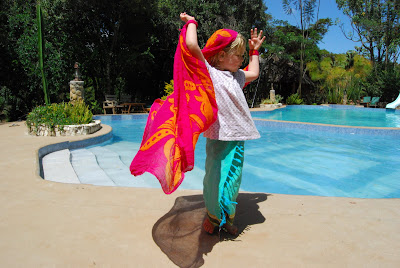We are driving through Lewa, on our way to spend the night with Al’s sister Caroline. It is hot and Lila, Uma, Evie and Lali are sitting on the roof of the car, their legs dangling down through the sun roof.
Out of the window we pass Acacia trees, zebra grazing on the dry, silvery grass, giraffe. Out of the corner of my eye I see two golden mounds of earth, smooth and rounded. One lift’s it head. It is a male lion, a pair of them, huge, basking in the sun.
Al drives off the dirt road into the bush to get a closer look. As we stop a lioness lifts herself up out of the long grass where she has been sleeping, just a few meters from us. She eyes us sleepily, and walks slowly over to join the other lions.
We are spellbound, even the children fall silent. The male lions only glance over at us, not bothering to get up, turning their heads instead to gaze at the distant herd of buffalo.
We are late for lunch, so we drive on, crossing a small river and up into the dusty hills. Al tells me how the rains have failed, the watering holes are all drying up, the grass is yellowing. We pass the cracked dusty basin of a dried up lake. A solitary zebra watches us go.
But now, as we drive, the sky slowly darkens, brilliant blue sinking into a deep, bruised purple. The grasses begin to glow with an electric light, the low rumble of thunder moving closer. As the temperature drops we start to shiver.
Suddenly it starts to rain, hard. Within a few minutes the dusty dirt road has turned to black, slippery mud, known as Black Cotton. The car tyres struggle to grip it’s surface, slipping and sliding, skidding in circles. The roads are hump-backed, with ditches on either side, and it takes all Al’s strength not to fall into the ditch.
Up ahead we see a land rover horizontal across the road, it’s back tyres sunk into the ditch. There is no way past it. We decide to drive out into the bush, over the grass where there’ll be more traction, following the direction of the road.
As we draw level with the Land Rover it’s driver walks towards us through the rain. He is a friend of Al's, and has called for a truck to come and tow him out. We offer him a lift, but he doesn’t want to leave his car, which is full of provisions.
The tyres are managing well on the grass, but the ground is rough, full of dips and holes, and now large rocks. We can’t continue, and have to try and get back onto the road. But there is now a ridge, dropping down into a ditch, between us and the road, and the rain is getting heavier.
Lali and Evie are unperturbed, they are Bush Girls, they tell me, and have seen it all before. “Bush Girls aren’t scared” says Evie excitedly. But Lila and Uma don’t see the adventure of it. As Alastair attempts to drive up the ridge for the fourth time, the wheels spinning wildly in the mud, the car lurching over to one side like a ship in a stormy sea, Uma and lila start to cry.
“Are you trying to kill us?” Lila screams, as Uma sobs into her hands and begs us to let her get out and walk. I take the wheel while Al gets out and tries to position large boulders under the wheels of the car. I rev the engine, but nothing happens.
We are stuck, the belly of the car resting on the hump of the ridge, with only one front and one back wheel touching the ground. With no mobile signal, and still a fair way from Caroline’s house, there is nothing to do but sit and wait. Hopefully, she’ll realize something’s up and come and rescue us.
She does. We see her reversing down the centre of the road towards us, slipping from side to side. She later told us she had reversed as she knew how hard it would be to turn around in that mud. Lila and Uma scramble up into her solid Land Rover, feeling braver now, managing a smile.
Al and Caroline fix up a tow rope and haul Al’s car off the ridge and back onto the road. It is towed all the way back to Caroline’s house, its wheel arches so clogged with mud the wheels can barely turn.























